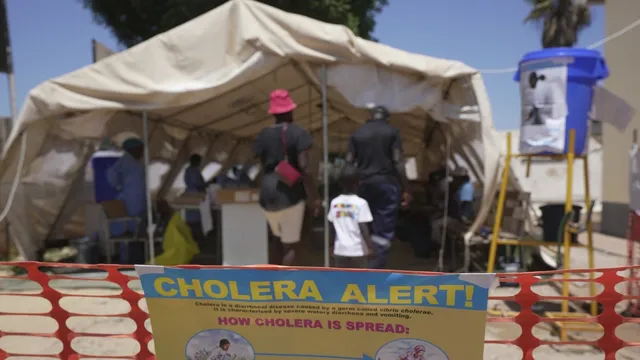Red Cross volunteers and health officials respond quickly to prevent the spread of cholera, which shuts down communal life and saves lives.
In Mapanza, a small community in southwest Zimbabwe, the streets are empty of youngsters playing where they usually would be. There are no longer any group dinners, no one laughs, and rain boots and safety suits have taken the place of regular clothes.
The cholera outbreak that is plaguing the village is a vivid reminder of how serious the illness is.
The three big tents in the center of the community are surrounded by puddles after a recent day of intense rain. Medical staff enters and exits the tents wearing masks and gloves. IV drips are brought into the tent containing the sickest patients.
Health professionals care for individuals whose illnesses have stabilized in the other two tents. Now and then, a curious youngster peers out from the tent. She looks to be in her early fifties.
Furthermore, the community’s single water source became tainted. Since cholera spreads rapidly through water, the estimated number of sick people in the village was close to half. The lack of medical services in the region exacerbates the condition, which in a matter of hours becomes serious.
Alec remembers people lying on the ground, with nowhere to go. “People began having a lot of diarrhea and vomiting a lot,” he claimed. A local couple attempted to transport as many people as they could to the hospital in Chiredzi, but the task proved to be too much for them since about half of the compound’s population was down. Women and children were the most severely impacted; deaths also occurred.
It’s difficult for outsiders to believe that this nightmare occurred only a few weeks ago when they visited the village today. Thanks to those who came together to assist, fewer people are becoming ill and very few are dying, even though the events still hang heavy over the community and things are still very much out of the ordinary.
To ensure that patients could receive safe treatment and were not forced to lie on the ground, volunteers from the Zimbabwe Red Cross Society (ZRCS) promptly provided support to the Ministry of Health and Child Care by sending tents, medical supplies, and “oral rehydration solutions.” They were able to contain the outbreak in conjunction with the Ministry of Health.
Additionally, volunteers have been going door-to-door in communities teaching residents how to keep themselves and their loved ones safe and what to do if they fall ill.
The IFRC’s Disaster Response Emergency Fund (IFRC-DREF) provided CHF 500,000 to kickstart the initial response. Shortly after, the IFRC issued an emergency appeal to raise CHF 3 million to help control the spread and provide life-saving aid to over 550,000 people.
On behalf of the International Federation of Red Cross and Red Crescent Societies (IFRC), distributed by APO Group.

